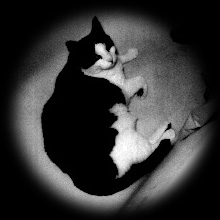 My
Little Friend:
My
Little Friend: My
Little Friend:
My
Little Friend:
 Igloo
In A Bathtab: Hi, everyone, this is my friend's cat. His name is Igloo.
I have him for almost 3 months now, while my friend is in Austria. He is
very handsome cat: he has very big dark (jet black) eyes and a cute pink
nose. I like him very much: except it's really hard to keep my mostly black
and dark brown clothes from showing his hair. He has silky white hair on
the belly and black hair on the back. I can't win: if I wear something
dark, white hairs show, and if I wear something light, black hairs show.
I don't care, I let him crawl all over me anyway. Cats are fun: I think
we share the same attitude toward life. A bit of food, a bit of hug, a
bit of cat-nap, and a bit of treat (sweets for me, cat-nip for Igloo) cheer
both of us up. I think I'm made to live with cats.
Igloo
In A Bathtab: Hi, everyone, this is my friend's cat. His name is Igloo.
I have him for almost 3 months now, while my friend is in Austria. He is
very handsome cat: he has very big dark (jet black) eyes and a cute pink
nose. I like him very much: except it's really hard to keep my mostly black
and dark brown clothes from showing his hair. He has silky white hair on
the belly and black hair on the back. I can't win: if I wear something
dark, white hairs show, and if I wear something light, black hairs show.
I don't care, I let him crawl all over me anyway. Cats are fun: I think
we share the same attitude toward life. A bit of food, a bit of hug, a
bit of cat-nap, and a bit of treat (sweets for me, cat-nip for Igloo) cheer
both of us up. I think I'm made to live with cats.
Anyway, to close this iteration of web-index page, I want to write about
dream - how it shapes what we remember. It turned out we dream to remember,
literary! I coined "dream to remember" (I don't explicitly recall,
but the line can be from some song or poem I've read before) meaning I
rewrite some part of my past while dreaming - i.e., what I dream about
my past is going to replace my real recollections of the past. It's a filter
process, I don't explicitly think about the past much while awake. But
when I sleep, people I knew or places I visited, come back to me. Dreaming
adds to my memory. I thought eventually things I dream or things enter
in my dream is my past (or what I can recall about my past). I feel that
I dream to think and remember.
It turned out my sentiment is roughly what's going on with my brain during
sleep. Long-term consolidation takes place while we dream (REM sleep).
After initial encoding, it takes some time for memory to become fully established
or organized in the brain. Initially bits and pieces of information are
stored individually in various parts of the brain. The instructions on
how to assemble information to form episodic memory is also stored separately.
Eventually, the instructions are shifted to the regions of the brain with
all the component pieces of the episodes to form patterns for permanent
storage.
It is known that dreams often contains remains of recent experiences. During
sleep, the hippocampus 'plays back' a recent experience to be recorded
permanently. What 'plays back' depends on encoding - what we thought about
the experience while we were awake. Sleep researchers now think that as
we sleep, our brains work to save the experiences for life-time storage.
All this is fascinating to me. However, most of the time, I'm insomniac.
Usually I promptly wake up after 5 hr. of sleep. It's really amusing. When
I wake up, it's usually too early to do anything. Therefore, I think about
what I dreamed during sleep. Sometimes, I don't really remember. Other
times, I just remember the feelings or tones of the dream. Sometimes, I
try to write out the story, but there's no time to record or decode everything.
I'm left with this feeling of incompleteness, as if a half of me is invisible
to myself. (August 13, 1997).
Source(s): Daniel L. Schacter, "Searching for memory: the brain,
the mind, and the past", (New York, 1996).